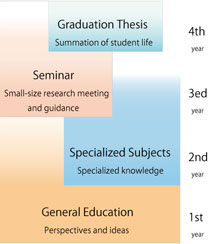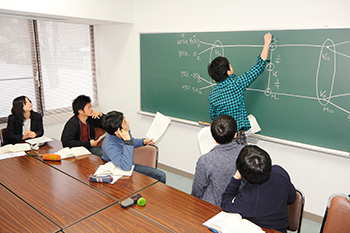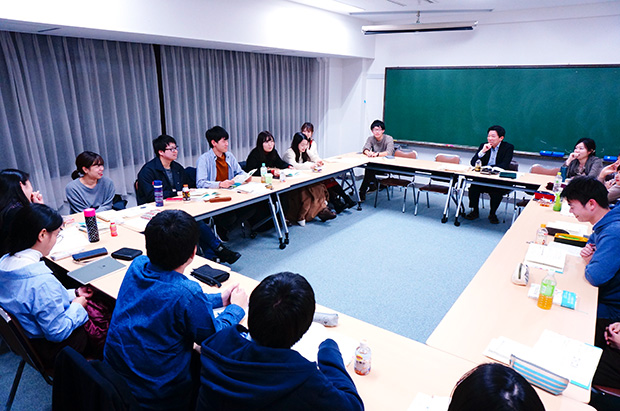General Education
 In the first year, students take courses from a variety of disciplines in natural sciences, social sciences, and humanities. Through the general education, students build the necessary foundations to study more specialized subjects in later years. During this year, students acquire insights to comprehend social phenomena in a realistic manner.Students are also encouraged to study foreign languages to prepare to play an active role in the global environment.
In the first year, students take courses from a variety of disciplines in natural sciences, social sciences, and humanities. Through the general education, students build the necessary foundations to study more specialized subjects in later years. During this year, students acquire insights to comprehend social phenomena in a realistic manner.Students are also encouraged to study foreign languages to prepare to play an active role in the global environment.
Specialized Study
In the second year, the specialized study begins. Some subjects are designed for second-year students and others are designed for third- and fourth-year students. For example, students can learn economics step by step by taking Microeconomics I in the 2nd year and Microeconomics II in the 3rd year.
Intensive and Special Lectures
The specialization and diversification of the modern economics and business administration make it difficult for one university to conduct leading-edge researches and lectures in all fields. Instead, we invite leading researchers from other universities and research institutions and offer intensive lectures by them. The intensive lectures are normally held for one week at the end of the first semester.
We also invite policy-making professionals from various government agencies and professionals in finance and management (corporate entrepreneurs, financial experts, accountants) to give special lectures several times throughout the year. This provides students with opportunities to learn practical issues and skills in the forefront of economics and business administration.
Seminars

Participating in a seminar (“zemi”) is mandatory part of the curriculum. Each student in the School of Economics and Business belongs to a seminar small-sized study group with regular meetings throughout their third and fourth years.
A seminar offers small-sized research meetings (four to seven students). Students can receive firsthand research guidance from the instructor. As seminars are scheduled at the final periods of the day, participants can extend discussion hours if necessary. Third- and fourth-year students gathering together for group study is what makes seminars in our program unique. One benefit of seminar study is that junior students can get advice from senior students on how to deal with graduation thesis, how to search for jobs, etc., based on their own experience. The close relationship with your classmates, your senior and junior friends, and the seminar instructor will be a valuable asset for you.
As the summary of the two years of their seminar study and as the proof of the four years of study in university, all students write a graduation thesis. Exceptional graduation theses will be awarded “Graduation Thesis Scholarship Program” by the School.

The Origin of Seminars
One feature of the educational program of our School is what is called ‘seminar’ (“zemi” in Japanese).
‘Seminar’ refers to an old tradition of small-group study, or small studying group, and it is quite different from classroom lectures. The introduction of seminars to Japan’s university education is ascribed to Inazo Nitobe.
Nitobe, the well-known author of “Bushido: The Soul of Japan,” graduated from Hokkaido University (the former Sapporo Agricultural Institute). Later, he became the head of the Department of Academic Affairs of the institution. As part of the curriculum reform in 1895, Nitobe adopted what is now known as seminar, as counterpart of the group work for experiments in natural sciences, and he incorporated it into the liberal arts education in humanity and social sciences. Nitobe’s portrait was featured on the 5000-yen bank note from 1984 to 2004.
 Faculty of
Faculty of